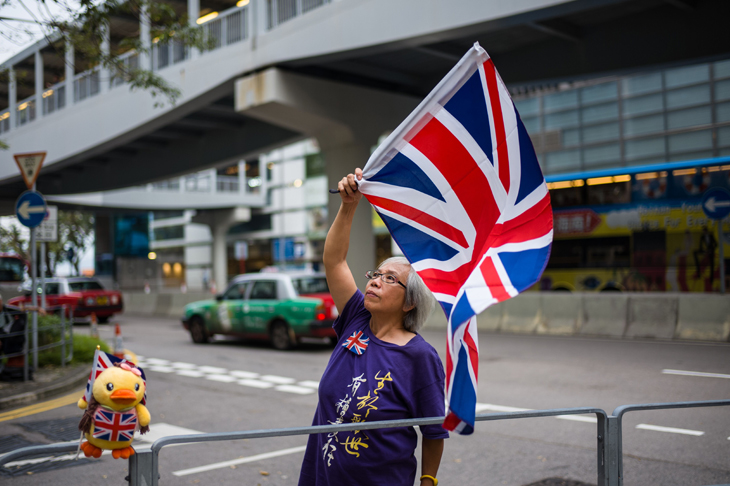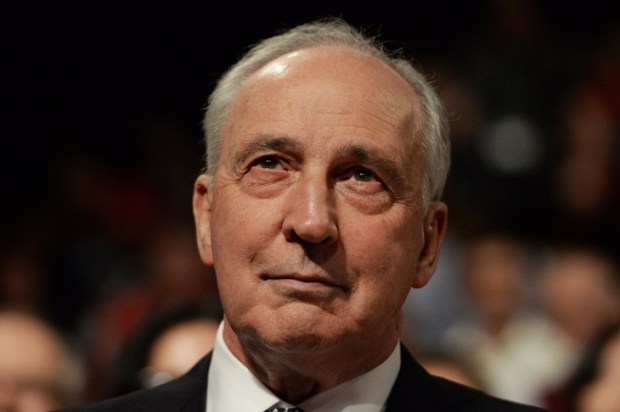These are extraordinary days for the Anglosphere. As China and the EU show their contempt for ordinary people, the values Britain gave the world — democracy, the rule of law, individual liberty, tolerance for minorities —have received a ringing endorsement.
In Hong Kong, people are peacefully protesting in their millions to hold on to this precious legacy. The threat of extradition to China, with its brutal mockery of justice, has galvanised Hong Kongers, who have shown extraordinary courage in defying Beijing. What could better represent the fusion of British and Chinese tradition, than the umbrella, carried by tens of thousands of Hong Kongers in their 2014 democracy protests. At the end of that round of protests, the demonstrators said, ‘We’ll be back,’ and here they are.
In Australia, an island continent blessed with such splendid isolation that it inevitably breeds complacency, we have been slow to respond. This week however, Victorian Liberal MP Kevin Andrews and Labor senator Kimberley Kitching, announced their intention to set up a ‘Parliamentary Friends of Democratic Hong Kong’ group to call for the protection of democratic values and a peaceful resolution to the conflict.
The visit to Australia of Hong Kong pop star and activist, Denise Ho, exposed the pusillanimity of Australian officialdom. An event at the National Gallery of Victoria called ‘Be Water: Hong Kong vs China’ with Ms Ho and political cartoonist Badiucao to discuss art and resistance in Hong Kong was cancelled due to ‘security concerns.’ Ms Ho rightly tweeted that ‘self-censorship is real’ and ‘if everyone turns away due to fear, what will our world become?’
At Australian campuses, the fear is real. This month, a motion in support of Hong Kong at the University of Sydney Student Representative Council brought the meeting to a standstill. When one student moved the motion, another stood up to yell in Mandarin, ‘I love China’ along with other profanities. Those who support Hong Kong were so worried about the threat to their safety posed by pro-Beijing activists that everyone had to put their phones into Airplane mode. Even so, the vote was thwarted and had to be tabled for the next meeting.
Australia has already benefited from two big outflows of Hong Kongers; the first following the Tiananmen massacre in 1989 and the second just before the handover of sovereignty back to China in 1997. There are already signs that a new exodus may be afoot. This would be welcomed by Australians who have first-hand experience of how well these hard-working, entrepreneurial people who value liberty and education have integrated into Australian society.
On the other side of the world, Australians are troubled by the convulsions shaking Westminster, the birthplace of our democracy. More than a million Australians were born in Britain, more than in any other country, and we host a large British expatriate population. Most other overseas-born Australians hale from former British colonies such as New Zealand, Hong Kong, India, South Africa, Malaysia and Sri Lanka. Britain is our second largest foreign investor (after the US) and our fifth largest trading partner.
There is only one response in Australia to the suggestion that Britain would face shortages if it crashes out of the EU with a ‘No Deal’ Brexit and that is, ‘not if we can help it!’ Australia already feeds some 36 million people around the world and could easily ramp that up. Our prime minister has said a free trade agreement with the UK could be concluded in less than a year and our trade minister said a deal could be done in months, maybe even weeks. In this, Australia has form. We concluded FTAs with China, Korea and Japan in just 12 months.
A poll which shows that more than half of British adults believe the result of the 2016 referendum should be respected is heartening. Nor is it surprising that of those who voted to Remain, more than a third now want Brexit delivered. How could it be otherwise when Brussels has expressed such breathtaking contempt for the will of British people?
All EU member states owe their liberty to the preparedness of British and Commonwealth peoples to lay down their lives in the fight against Nazi and German imperialism but where is the gratitude? Australia is used to this. From a population of fewer than five million in 1914, more than 400,000 enlisted to serve in World War I, more than a third of the eligible population, of whom more than 60,000 were killed and 156,000 wounded, gassed, or taken prisoner. Almost a million served in World War II.
When Australia was unceremoniously booted out of the UK market on its entry into the European Community in 1973 — a hard exit if ever there was one — our butter exports to the UK dropped by more than 90 percent and our apple exports by more than two thirds. But what we lost in trade to the UK, we more than made up for in exports elsewhere. More importantly, we retained that most precious commodity of all — our sovereignty.
Almost half a century later, Britons were absolutely right to take the unexpected opportunity Prime Minister David Cameron presented them to leave the EU. They had voted in 1975 to be part of the European Communities, a collective term referring to the European Coal and Steel Community, the European Economic Community and the European Atomic Energy Community. The EU today is a behemoth, acquiring ever more power and headed by a president-elect, Ursula von der Leyen, who has muted her call for a United States of Europe only because it isn’t popular.
At this distance, the hysteria in Britain about a ‘no deal’ Brexit seems incomprehensible. As Charles Michel, Belgian’s interim prime minister and incoming president of the European Council put it, ‘between a ‘no deal’ and a ‘bad deal,’ I prefer a ‘no deal,’ which will at least have the merit of clarity and responsibility.’
As for the threatened chaos at the ports that the EU might inflict — as Christine Lagarde, the incoming president of the European Central Bank observed, ‘the larger the impediments to trade in the new relationship, the costlier (Brexit) will be.’ These are costs that will be borne by the EU as much as Britain and with the EU economy already slowing to just 1.4 per cent in the second quarter, it is bastardry that it can ill-afford. Britain on the other hand, grew at its fastest pace in six months. Those who dismiss the Anglosphere as nothing more than a rhetorical wheeze take note. It values continue to inspire people around the world and however much others try to crush them, we are living through one of its finest hours.
Got something to add? Join the discussion and comment below.
Get 10 issues for just $10
Subscribe to The Spectator Australia today for the next 10 magazine issues, plus full online access, for just $10.
You might disagree with half of it, but you’ll enjoy reading all of it. Try your first month for free, then just $2 a week for the remainder of your first year.














Comments
Don't miss out
Join the conversation with other Spectator Australia readers. Subscribe to leave a comment.
SUBSCRIBEAlready a subscriber? Log in